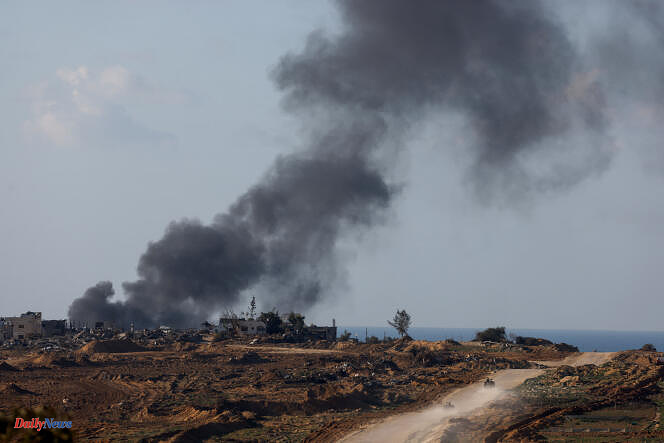Since the start of the war between Israel and Hamas almost three months ago, Israeli military operations have left 22,600 dead in Gaza, mostly women and minors, according to figures published Friday January 5 by the Ministry of Defense. the health of Hamas, in power in Gaza since 2007. This assessment could not be independently verified.
Israel vowed to “destroy” the Islamist movement – considered terrorist by Israel, the United States and the European Union – after its attack on Israeli soil on October 7, which left some 1,140 dead, mainly civilians, according to a count by Agence France-Presse (AFP) based on the Israeli toll. Around 250 people were taken hostage; around a hundred of them were released during a truce at the end of November.
Nearly three months after the start of the conflict between Israel and Palestinian Hamas, the Israeli defense minister presented for the first time a plan for the post-war in Gaza, where Israel continued its bombings and ground operations on Friday.
The plan presented by Yoav Gallant, which has yet to receive the approval of a divided government, provides for the continuation of operations in Gaza until the "return of the hostages", the "dismantling of Hamas' military and governance capabilities" and “the elimination of military threats.”
For the post-war period, Mr. Gallant advocates a solution without Hamas and without an Israeli civilian presence, effectively rejecting calls from two far-right ministers for the return of Jewish settlers to Gaza and the “emigration” of Palestinians . These comments sparked an international outcry, denounced in particular by the American ally and the European Union.
“There will be no Israeli civilian presence in the Gaza Strip after the objectives of the war have been achieved,” declared Mr. Gallant, specifying however that the army would retain “its freedom of action” in this territory. to curb any possible “threat”. “The people of Gaza are Palestinian. Therefore, Palestinian entities will be responsible [for management] on the condition that there is no hostile action or threat against the State of Israel,” he stressed, without further details.
The Israeli army announced the "elimination of a terrorist cell" in Bureij in the central Gaza Strip, and the destruction of rocket launch sites towards Israel in Khan Younes, the large southern city, epicenter of fights.
On the ground, the ordeal continues for some 2.4 million Gazans, including around 1.9 million displaced by the conflict: they lack water, food, medicine and care, with hospitals no longer functioning or very difficult.
In Rafah, the last town in the south of the small besieged territory, "around 500,000 displaced people live around shelters, in the streets or on the roads", described Adnan Abu Hasna, a spokesperson in Gaza for the UN agency for Palestinian refugees (UNRWA).
The head of American diplomacy, Antony Blinken arrived in Turkey on Friday, the first stop of his fourth tour to the Middle East since the start of the conflict, during which he intends to plead for increased aid for Gaza.
The head of American diplomacy, Antony Blinken, arrived in Turkey on Friday, the first stop on his fourth tour of the Middle East since the start of the conflict, during which he intends to plead for increased aid for Gaza.
Mr. Blinken expects difficult discussions during this new tour which will take him, in addition to Israel at the start of next week, to five Arab countries - Jordan, Qatar, Emirates, Saudi Arabia and Egypt -, as well as to West Bank, seat of the Palestinian Authority, its spokesperson, Matthew Miller, told the press.
His trip also aims to stave off an extension of the conflict, after the elimination - attributed to Israel - of Hamas number two, killed Tuesday in the southern suburbs of Beirut, a Hezbollah stronghold, by a drone strike. Hassan Nasrallah, the leader of this Shiite movement supported by Iran and ally of Hamas, assured Friday that his fighters would “respond” on “the battlefield” to this strike.
On the border with Lebanon, exchanges of fire between Hezbollah and Israeli forces have been almost daily since the start of the conflict. On Friday, the Israeli army again carried out air raids targeting Hezbollah sites. In the Red Sea, the Houthi rebels of Yemen, supported by Iran, are increasing attacks on commercial ships “supporting” Gaza.












